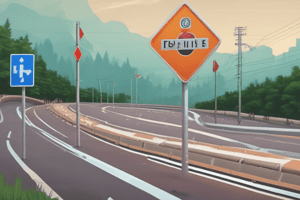Podcast
Questions and Answers
What is the primary reason why drivers tend to misjudge their braking distance?
What is the primary reason why drivers tend to misjudge their braking distance?
- They are driving too slow.
- They are not aware of their speed due to speed blindness. (correct)
- They are not concentrating on the road.
- They are not familiar with the road.
Why do modern cars contribute to speed blindness?
Why do modern cars contribute to speed blindness?
- They are very heavy.
- They are very noisy.
- They handle smoothly and quietly. (correct)
- They have a rough ride.
What is the stopping distance required for a car traveling at 60 km/h on a dry road?
What is the stopping distance required for a car traveling at 60 km/h on a dry road?
- 70 meters of road.
- 20 meters of road.
- 50 meters of road.
- 35 meters of road. (correct)
What is the primary factor that contributes to the underestimation of speed?
What is the primary factor that contributes to the underestimation of speed?
What happens to the braking distance when you accelerate?
What happens to the braking distance when you accelerate?
What is the result of speed blindness on a driver's ability to judge their braking distance?
What is the result of speed blindness on a driver's ability to judge their braking distance?
Why do drivers tend to accelerate without considering their braking distance?
Why do drivers tend to accelerate without considering their braking distance?
What is the effect of monotonous driving on a driver's ability to judge their speed?
What is the effect of monotonous driving on a driver's ability to judge their speed?
What is the stopping distance required for a car traveling at 120 km/h?
What is the stopping distance required for a car traveling at 120 km/h?
What is the primary consequence of speed blindness?
What is the primary consequence of speed blindness?
Flashcards are hidden until you start studying
Study Notes
Regulating the Roads
- There are three types of traffic signs: warning signs (triangular, cautioning danger), regulatory signs (circular, providing positive instructions), and supplementary signs (rectangular, providing additional information).
- Mandatory signs are prohibitive (red circle) or indicative (blue circle).
- Direction signs are rectangular and inform about directions and local information.
- Temporary signs are on an orange background.
Road Markings
- Road markings are used to clarify rules and regulations, warning of dangers, dividing roads into lanes, separating motor vehicle lanes from cycle tracks or pedestrian ways, and signaling prohibitions.
- Road markings can be lines (continuous or broken), arrows, studs, symbols, and text messages.
- Broken lines function as recommendations, warnings, or guides for road users.
Duty towards Unprotected Road Users
- It is essential to respect pedestrians and cyclists, as they are vulnerable road users.
- When interacting with other road users, we should show courtesy, compromise, and adjust to ensure safe sharing of the road environment.
Order of Traffic Precedence
- In situations with multiple instructions, the order of precedence is: 1) signals given by a police officer, 2) traffic lights, 3) traffic signs, and 4) rules of the road.
Roundabouts
- Roundabouts are similar to ordinary crossroads with one or more lanes encircling a central island.
- When approaching a roundabout, maintain the same lane before, during, and after exiting to reduce the risk of colliding with other vehicles.
Inside the City Limits
Using Your Eyes and Other Senses
- The central visual field represents the tiny area in focus, while the peripheral vision is blurred.
- Speed blindness can occur due to a lack of stimuli, making it difficult for drivers to form an accurate impression of their true speed.
- Smooth handling and quiet cars can contribute to speed blindness, making it essential to be aware of one's speed.
- The stopping distance increases with speed, and it is vital to consider this when accelerating.
Studying That Suits You
Use AI to generate personalized quizzes and flashcards to suit your learning preferences.




